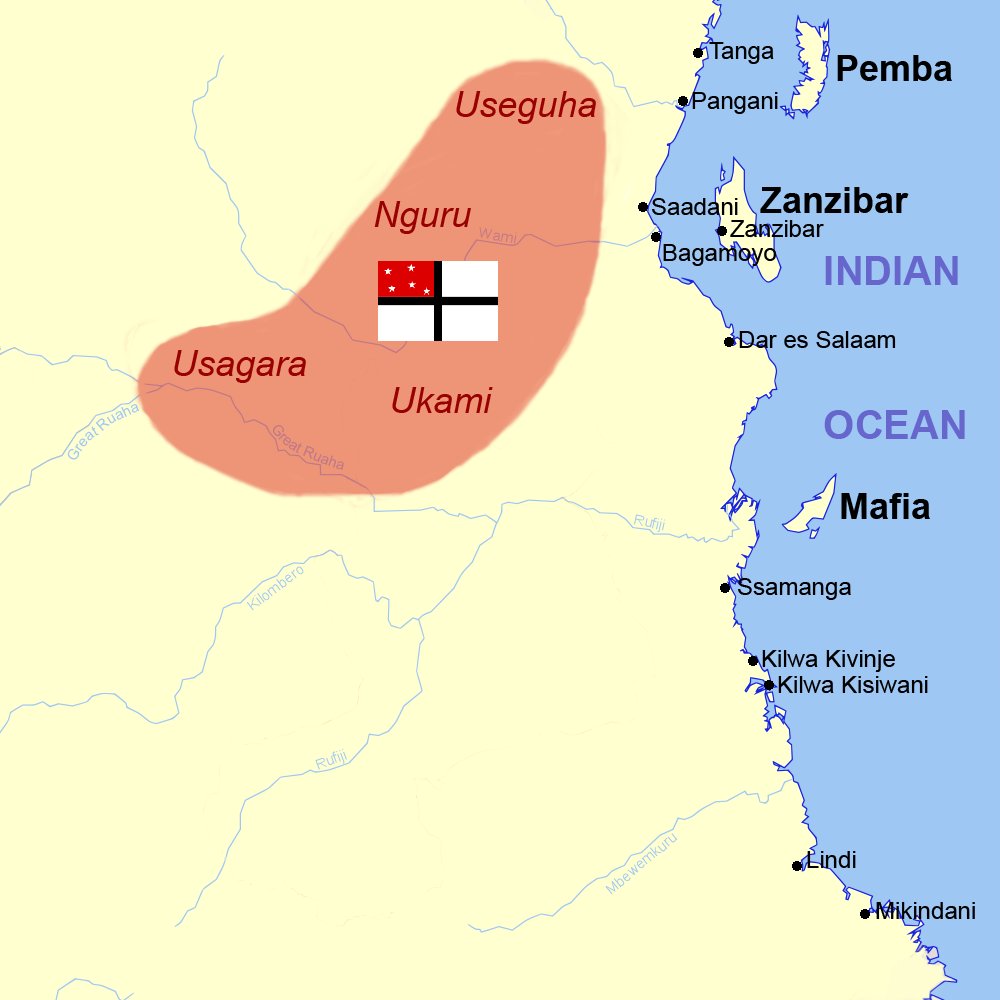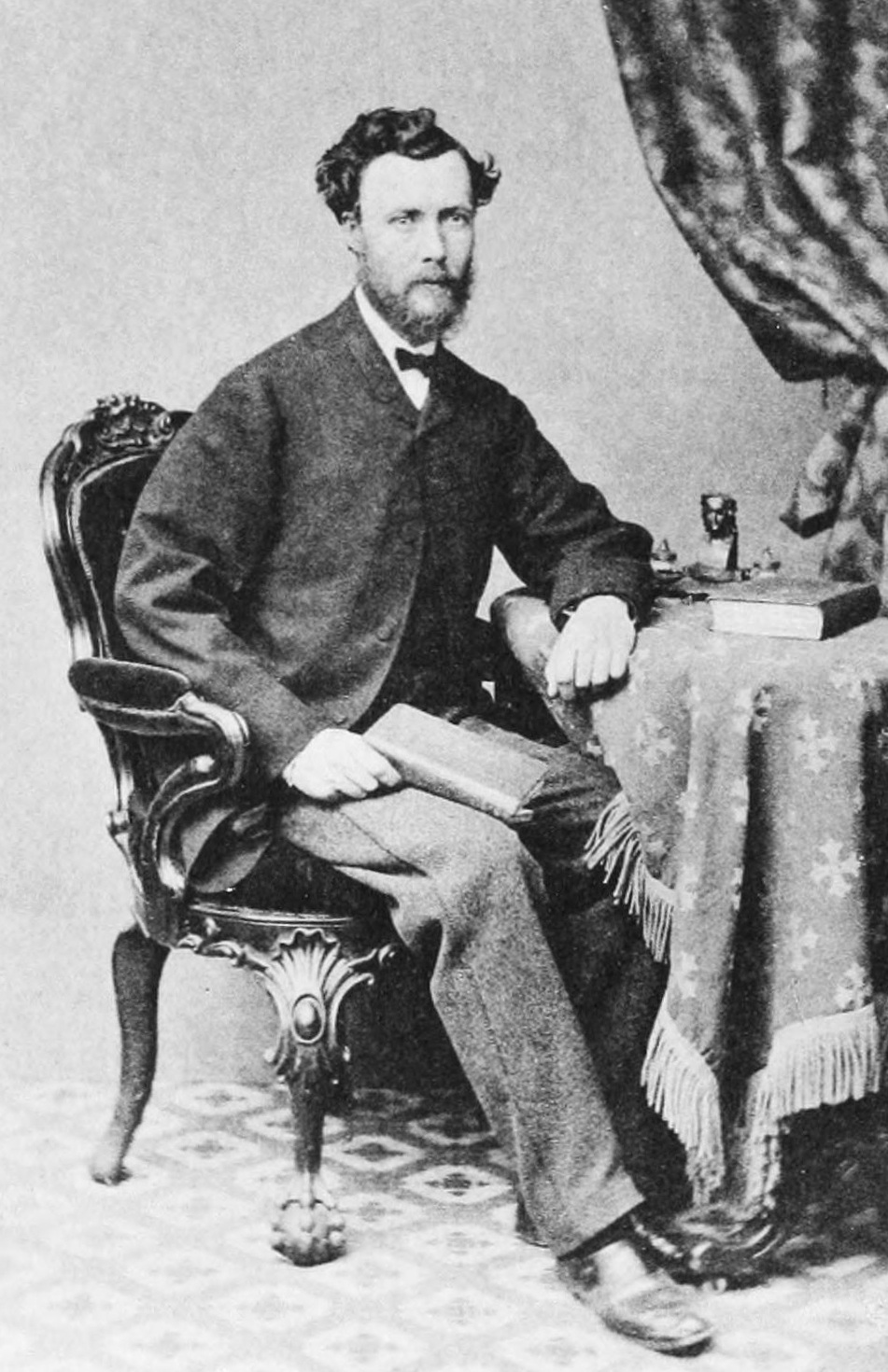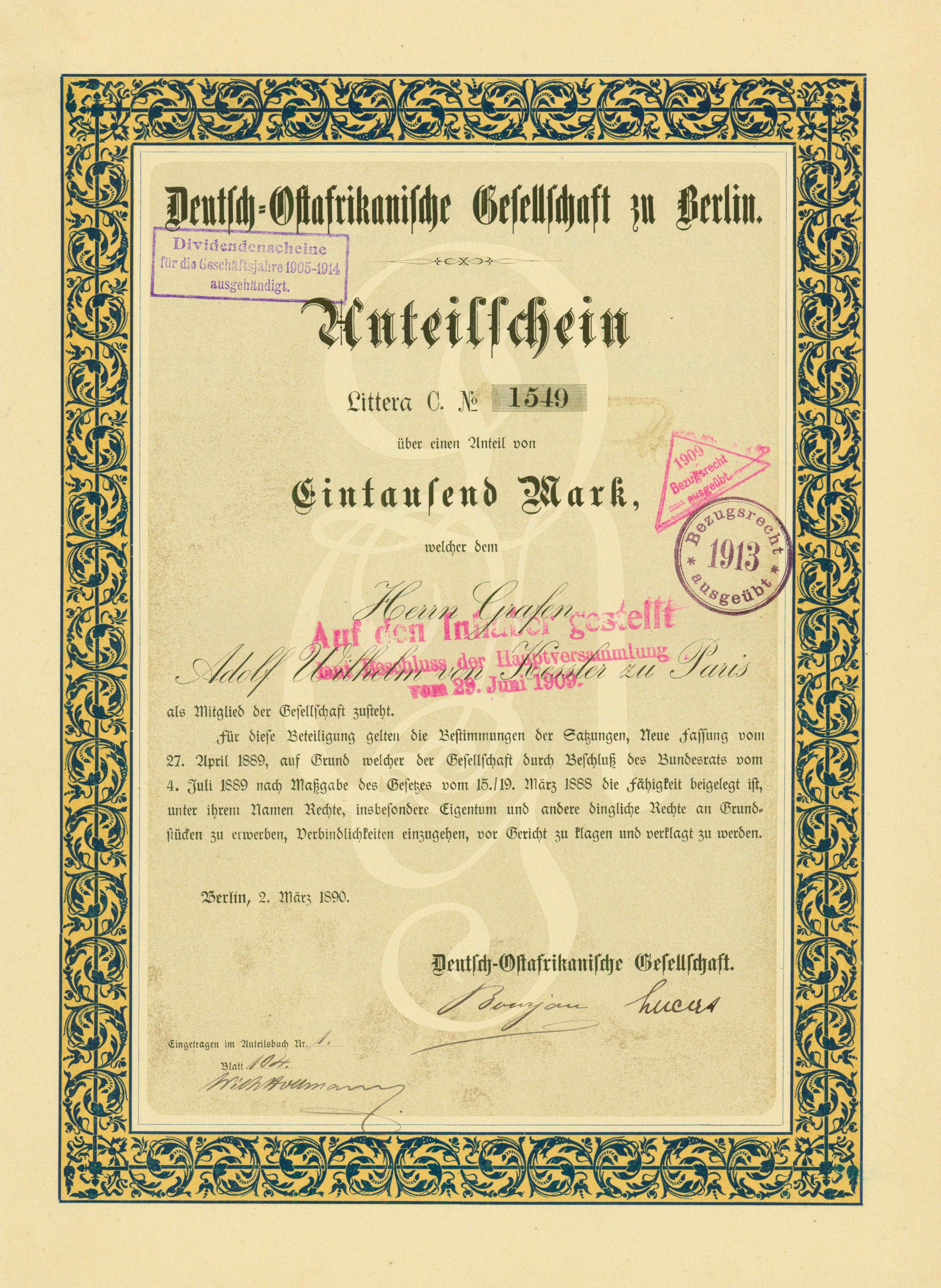|
Society For German Colonization
The Society for German Colonization (german: Gesellschaft für Deutsche Kolonisation, GfdK) was founded on 28 March 1884 in Berlin by Carl Peters. Its goal was to accumulate capital for the acquisition of German colonial territories in overseas countries. History Peters had just returned from London, where he lived with his well-off uncle Carl Engel and studied the principles of European colonialism. In the autumn of 1884 he proceeded, together with his friends Karl Ludwig Jühlke and Count Joachim von Pfeil, to the Sultanate of Zanzibar. Peters had initially planned to prospect for gold in Southern African Mashonaland (in present-day Zimbabwe) but discovered that the territory had already been claimed by the British. Peters' Zanzibar expedition was a nuisance to the German government of Chancellor Bismarck, focused on good relations with both Sultan Barghash bin Said and the British Empire, and the German consul Gerhard Rohlfs made that clear to him. Peters, Jühlke and von Pf ... [...More Info...] [...Related Items...] OR: [Wikipedia] [Google] [Baidu] |
John Kirk (explorer)
Sir John Kirk, (19 December 1832 – 15 January 1922) was a physician, naturalist, companion to explorer David Livingstone, and British administrator in Zanzibar, where he was instrumental in ending the slave trade in that country, with the aid of his political assistant, Ali bin Saleh bin Nasser Al-Shaibani. Early life and education He was born on 19 December 1832 in Barry, Angus, near Arbroath, Scotland, and earned his medical degree from the University of Edinburgh, presenting his thesis '''On functional disease of the heart. Family Kirk's daughter, Helen, married Major-General Henry Brooke Hagstromer Wright CB CMG, the brother of the famous bacteriologist and immunologist, Sir Almroth Edward Wright and of Sir Charles Theodore Hagberg Wright, Secretary and Librarian of London Library. Kirk's son Colonel John William Carnegie Kirk was author of ''A British Garden Flora''. The engineer, Alexander Carnegie Kirk, was John Kirk's elder brother. Career Explorer From 1858 t ... [...More Info...] [...Related Items...] OR: [Wikipedia] [Google] [Baidu] |
East India Company
The East India Company (EIC) was an English, and later British, joint-stock company founded in 1600 and dissolved in 1874. It was formed to trade in the Indian Ocean region, initially with the East Indies (the Indian subcontinent and Southeast Asia), and later with East Asia. The company seized control of large parts of the Indian subcontinent, colonised parts of Southeast Asia and Hong Kong. At its peak, the company was the largest corporation in the world. The EIC had its own armed forces in the form of the company's three Presidency armies, totalling about 260,000 soldiers, twice the size of the British army at the time. The operations of the company had a profound effect on the global balance of trade, almost single-handedly reversing the trend of eastward drain of Western bullion, seen since Roman times. Originally chartered as the "Governor and Company of Merchants of London Trading into the East-Indies", the company rose to account for half of the world's trad ... [...More Info...] [...Related Items...] OR: [Wikipedia] [Google] [Baidu] |
German East Africa Company
The German East Africa Company (german: Deutsch-Ostafrikanische Gesellschaft, abbreviated DOAG) was a chartered colonial organization which brought about the establishment of German East Africa, a territory which eventually comprised the areas of modern Tanzania, Burundi, and Rwanda. The Company originated in 1884 as the ( Society for German Colonisation) with the aim of trading in Africa. The German protectorate of Wituland (within modern Kenya) originated as a separate German sphere of influence in 1885. In April of the same year, the company leased the coastal strip opposite Zanzibar from Sultan Khalifa bin Said for 50 years. Its attempt to take over the administration led to a general revolt along the coast of what is now Tanzania. The company could only hold Dar es Salaam and Bagamoyo with the help of the German navy. In 1889 it had to request the assistance of the German government to put down the rebellion. In 1891, after it became apparent that the company could not ... [...More Info...] [...Related Items...] OR: [Wikipedia] [Google] [Baidu] |
William I, German Emperor
William I or Wilhelm I (german: Wilhelm Friedrich Ludwig; 22 March 1797 – 9 March 1888) was King of Prussia from 2 January 1861 and German Emperor from 18 January 1871 until his death in 1888. A member of the House of Hohenzollern, he was the first head of state of a united Germany. He was de facto head of state of Prussia from 1858, when he became regent for his brother Frederick William IV, whose death three years later would make him king. Under the leadership of William and his minister president Otto von Bismarck, Prussia achieved the unification of Germany and the establishment of the German Empire. Despite his long support of Bismarck as Minister President, William held strong reservations about some of Bismarck's more reactionary policies, including his anti-Catholicism and tough handling of subordinates. In contrast to the domineering Bismarck, William was described as polite, gentlemanly and, while staunchly conservative, more open to certain classical liberal id ... [...More Info...] [...Related Items...] OR: [Wikipedia] [Google] [Baidu] |
Mahdist War
The Mahdist War ( ar, الثورة المهدية, ath-Thawra al-Mahdiyya; 1881–1899) was a war between the Mahdist Sudanese of the religious leader Muhammad Ahmad bin Abd Allah, who had proclaimed himself the "Mahdi" of Islam (the "Guided One"), and the forces of the Khedivate of Egypt, initially, and later the forces of Britain. Eighteen years of war resulted in the nominally joint-rule state of the Anglo-Egyptian Sudan (1899–1956), a ''de jure'' condominium of the British Empire and the Kingdom of Egypt in which Britain had ''de facto'' control over the Sudan. The Sudanese launched several unsuccessful invasions of their neighbours, expanding the scale of the conflict to include not only Britain and Egypt but also the Italian Empire, the Congo Free State and the Ethiopian Empire. The British participation in the war is called the Sudan campaign. Other names for this war include the Mahdist Revolt, the Anglo–Sudan War and the Sudanese Mahdist Revolt. Background Followin ... [...More Info...] [...Related Items...] OR: [Wikipedia] [Google] [Baidu] |
Belgian Congo
The Belgian Congo (french: Congo belge, ; nl, Belgisch-Congo) was a Belgian colony in Central Africa from 1908 until independence in 1960. The former colony adopted its present name, the Democratic Republic of the Congo (DRC), in 1964. Colonial rule in the Congo began in the late 19th century. King Leopold II of the Belgians attempted to persuade the Belgian government to support colonial expansion around the then-largely unexploited Congo Basin. Their ambivalence resulted in Leopold's establishing a colony himself. With support from a number of Western countries, Leopold achieved international recognition of the Congo Free State in 1885. By the turn of the century, the violence used by Free State officials against indigenous Congolese and a ruthless system of economic exploitation led to intense diplomatic pressure on Belgium to take official control of the country, which it did by creating the Belgian Congo in 1908. Belgian rule in the Congo was based on the "colonial t ... [...More Info...] [...Related Items...] OR: [Wikipedia] [Google] [Baidu] |
Belgian Colonial Empire
Belgium controlled several territories and concessions during the colonial era, principally the Belgian Congo (modern DRC) from 1908 to 1960 and Ruanda-Urundi (modern Rwanda and Burundi) from 1922 to 1962. It also had small concessions in Guatemala (1843–1854) and in China (1902–1931) and was a co-administrator of the Tangier International Zone in Morocco. Roughly 98% of Belgium's overseas territory was just one colony (about 76 times larger than Belgium itself) – known as the Belgian Congo. The colony was founded in 1908 following the transfer of sovereignty from the Congo Free State, which was the personal property of Belgium's king, Leopold II. The violence used by Free State officials against indigenous Congolese and the ruthless system of economic extraction had led to intense diplomatic pressure on Belgium to take official control of the country. Belgian rule in the Congo was based on the "colonial trinity" (''trinité coloniale'') of state, missionary and priv ... [...More Info...] [...Related Items...] OR: [Wikipedia] [Google] [Baidu] |
Scramble For Africa
The Scramble for Africa, also called the Partition of Africa, or Conquest of Africa, was the invasion, annexation, division, and colonization of most of Africa by seven Western European powers during a short period known as New Imperialism (between 1881 and 1914). The 10 percent of Africa that was under formal European control in 1870 increased to almost 90 percent by 1914, with only Liberia and Ethiopia remaining independent. The Berlin Conference of 1884, which regulated European colonization and trade in Africa, is usually accepted as the beginning. In the last quarter of the 19th century, there were considerable political rivalries within the empires of the European continent, leading to the African continent being partitioned without wars between European nations. The later years of the 19th century saw a transition from " informal imperialism" – military influence and economic dominance – to direct rule. Background By 1841, businessmen from Europe had establis ... [...More Info...] [...Related Items...] OR: [Wikipedia] [Google] [Baidu] |
Berlin Conference
The Berlin Conference of 1884–1885, also known as the Congo Conference (, ) or West Africa Conference (, ), regulated European colonisation and trade in Africa during the New Imperialism period and coincided with Germany's sudden emergence as an imperial power. The conference was organized by Otto von Bismarck, the first chancellor of Germany. Its outcome, the General Act of the Berlin Conference, can be seen as the formalisation of the Scramble for Africa, but some historians warn against an overemphasis of its role in the colonial partitioning of Africa, and draw attention to bilateral agreements concluded before and after the conference. The conference contributed to ushering in a period of heightened colonial activity by European powers, which eliminated or overrode most existing forms of African autonomy and self-governance. Of the fourteen countries being represented, six of them – Austria-Hungary, Russia, Denmark, the Netherlands, Sweden–Norway, and the Uni ... [...More Info...] [...Related Items...] OR: [Wikipedia] [Google] [Baidu] |
Nguru Mountains
The Nguru Mountains are a mountain range in Morogoro Region, Tanzania, Africa. The Nguru Mountains are part of the Eastern Arc Mountains. The mountains are predominantly covered with rainforest, home to 83 species of birds (Romdal 2001) and African violets. There are a number of forest reserves in the mountains. Geography The Nguru Mountains cover an area of 1672.90 km². The highest elevation is 2400 meters in Nguru South. The range runs roughly northeast-southwest, and is split by the valley of the Mjonga River, a tributary of the Wami River. The range lies in the watershed of the Wami. The plain of the Wami and its tributary the Mkata lies to the southeast and east. The Uluguru Mountains lie to the southeast across the plain. The Ukaguru Mountains lie to the southwest, and the Nguu Mountains lie to the north; both ranges are separated from the Nguru Mountains by low hills. More hilly country separates the Maasai Steppe the northwest. Climate The Nguru mountains in ... [...More Info...] [...Related Items...] OR: [Wikipedia] [Google] [Baidu] |





